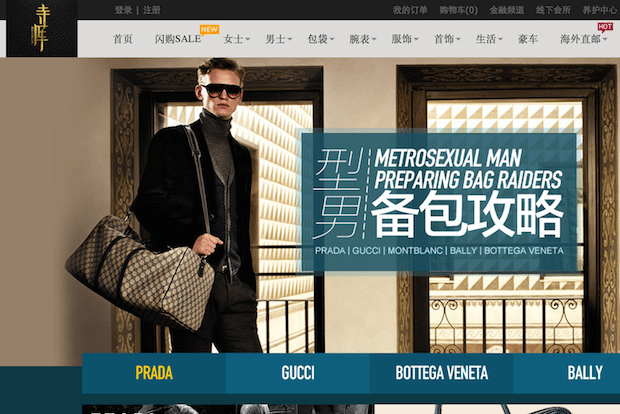
A screenshot from Chinese online consignment shop Secoo. (Secoo)
China’s luxury e-commerce market has many major players and no clear front-runner, meaning that industry experts are watching with anticipation to see which website will pull ahead. Investors have just shown faith in the promise one Chinese online luxury store that just received a record $100 million round of funding—a secondhand e-boutique named Secoo.
The e-commerce platform announced in late July that it has secured the amount, which is the biggest-ever round of funding for an online luxury store in China. Investors for this series D funding include IDG Capital Partners, Ventech China, Crehol Capital (Mulliez Family Fund), and Vangoo Capital. "The funds will mainly be used in our global strategic layout and overseas business expansions, as well as higher budget in marketing, developing its information technology infrastructure,” according to Secoo CEO Li Rixue. “In the future, we will try our best to meet the demands of high-end clients, both in mainland China and abroad, providing them with authentic, seasonal, and desirable luxury products."
Similar to the French site Vestiare Collective, Secoo functions as an online consignment shop for secondhand luxury goods, and its profits come from consignment fees. Sellers can either complete the entire consignment process online, or take items to the company’s brick-and-mortar “Secoo Clubs” in Beijing, Qingdao, or Shanghai. Items are evaluated by appraisers for condition and authenticity, and sellers can receive they payment either in cash or the website’s special virtual currency. The site also offers after-sales maintenance and auction options. Secoo has big global ambitions as well: it has clubs in Hong Kong and Tokyo, and is planning on opening more in Milan, New York, and Paris.
A maturing luxury market, high tariffs on new foreign luxury goods, and a wave of new bargain-hunting middle-class buyers have paved the way for discounted luxury shopping in China. In addition to the online secondhand market, brick-and-mortar consignment shops have also become increasingly popular. For buyers who prefer brand-new goods at a discount, luxury outlet malls are also springing up across the country.
One major obstacle that exists for Secoo’s business model is Chinese consumers’ fears of the country’s rampant fake goods market. The company is working hard to allay these concerns—Li noted in a recent Global Times interview that “the key thing for us is to ensure that the goods circulating in the market are not counterfeit,” and that the site employs appraisers from the United States and Japan.
The online shop has a wide range of competitors in China’s luxury e-commerce market, including flash sales sites such as Glamour Sales, traditional luxury e-boutiques such as Yoox and Shangpin, and increasingly, Alibaba’s B2B Tmall, which is working hard to bring luxury brands onboard its traditionally discount-driven platform.